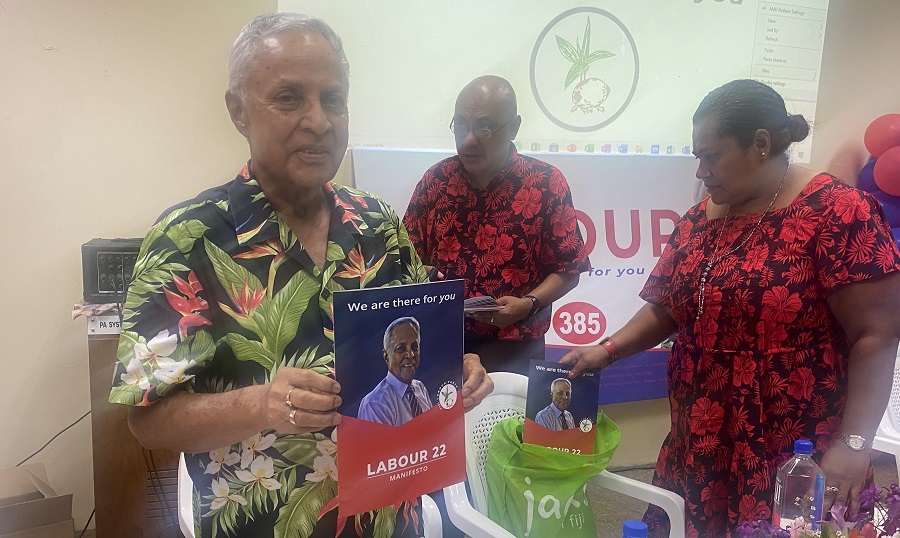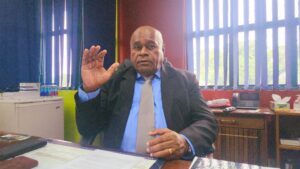Fiji Labour Party leader Mahendra Chaudhry says a Labour Government will restore Fijian lives and realise the country’s potential whilst reducing foreign debt.
He pointed to the Labour-led government’s 1999-2000 record in creating a 9.6% GDP economic growth, an achievement he says stands to date, and is a testament to the party’s ability to lead and bring about a country that Fijians “dream about.”
“But not only the size of the growth – Labour’s GDP related to meaningful economic growth,” Mr Chaudhry said. “It was GDP based on increased productivity in sugar and tourism, with very low inflation and a strong Fijian dollar. If we were given our full term in office in 1999, Fiji would be a very different place. If we had governed since 1999 till today, Fiji would be on par with Australia and New Zealand, there is no doubt about that.”
To reshape and revive the economy, Mr Chaudhry said it must be centred around Agriculture and the production sector including the revitalisation of the sugar sector.
“Once thriving industries like dairy and copra have fallen away. We will revive them. We need to invest more in R&D to develop alternate crops. Labour will foster innovation and advance the sector. Sugar is vital to our economic revival. We need sugar to boom, we need farmers to stay in sugar. It is imperative that we resurrect the sugar sector, put abandoned land back into use and produce more.”
Mr Chaudhry says part of the plan is to rebuild the Penang Mill and increase the guaranteed price from $85 to $102 per tonne immediately and conduct a review to align it with the actual cost of production, harvesting and transport. Critical as well, he adds is for farmers to be innovative and diversify their crops which not only enriches the soil but also allows them to produce a greater variety of products for the local market and broadens their income.
In addition, Fiji he said needs greater diversification of output and value-added output.
“Fiji’s biggest economic problem is that we have to import petrol from overseas. We can’t control the price so this affects the cost of living. The government throws their hands in the air and says that the cost of living has risen because of events overseas – even though the cost of living had been rising dramatically since the devaluation of the dollar in 2009, long before Covid.
“But Labour is proactive. We don’t throw our hands in the air and blame everybody else. We need to use sugarcane to reduce our imports. We need to manufacture ethanol which can be mixed with petrol. We can also produce juice, bagasse and other sugar-based products for local consumption, with a surplus for export. This will increase self-reliance and will bring down the cost of living. This is at the core of our economic revival. You don’t solve the cost of living crisis with a small pitiful handout. You solve it with a holistic approach to sound and innovative economic management. We must increase self-reliance and local capacity and reduce imports. At the core of our economic revival is production.”
Mr Chaudhry also laid out the party’s fiscal and macroeconomic policy that he believes will bring about the change that Fijians most need, whilst reducing both domestic and foreign debt.
“We can’t continue to consume more than we produce. That leads to more and more debt. Both as a nation and as an individual. We must learn to live within our means.
“We cannot continue with the current import-consumption based, debt-fuelled and inflation driven economy where GDP figures are more representative of the increase in prices rather than an increase in productivity.
“We must reform tax, redirect credit to productive areas of the economy, control our foreign currency outflow and end our dependence on foreign debt.”
To do that, Mr Chaudhry says Fiji must limit its non-essential imports, increase self-reliance and add value to its production.
In the first year of making government, Mr Chaudhry said they intend to reduce foreign debt by 4% in the first year and work towards reducing domestic debt within 3-5 years with a balanced budget.
“But we must turn the economy around first. We can’t just increase income tax and increase VAT to balance the budget.
“Controlling foreign currency outflow will also create a greater capacity for the domestic market to lend to the government.
“This is how Labour will fund their budget deficit. This will also allow a Labour government to fund substantial and ongoing infrastructure development.
“We can build the roads, bridges, airports, renewable energy plants, extensions and upgrades to electricity and water infrastructure, low-cost housing and so on with local funding and increased local private and public sector capacity. We can build all the infrastructure we need in a sustainable and future-proof way. But only under a Labour government.”
In their manifesto, the highlights of which were launched in Suva yesterday, the FLP promised the same and a number of firsts including the establishment of a National Health Insurance scheme, a housing project aimed to rid the country of its squatter settlement issues, the resuscitation of the economy by looking within, the reduction of the country’s debt, and generally better people’s lives through collaborations and meaningful discussions with all stakeholders, an approach that echoed through the party’s 12-page document.
“We need that mandate again to show what good governance is – We are there for you and we need the chance to show what we can do. And this is a manifesto that will create prosperity. This is a manifesto of hope.
“We can be the country we dream about under a Labour government and only a Labour government.
“Because we have the best interests of all the people of Fiji at heart. That’s the difference between Labour and other parties. Between this manifesto and the manifestos of other parties.
“You deserve better. Our people deserve better. But the choice is yours. The future is in your hands.”
Mr Chaudhry said people should not be swayed by the current administration’s narratives “that Fiji is developing and everything is fine” adding that people need only to look and focus on what the people are saying.
“This manifesto is about structuring the economy around the lives of our people and not the usual practice of structuring the lives of our people around the economy.
This is fair and this is what democracy is about. If Labour wins this election, the possibilities for Fiji will finally be realised.”
WORKERS RIGHTS
- Restore workers’ rights and grant them justice
- Establish the Tripartite machinery by statute to ensure a consultative approach to labour relations.
- Align policies with key ILO conventions and instruments.
- Restore permanent employment in the civil service
- Review current pay structure and service conditions
- De-politicise the service and replace expatriates with locals
- Provide for appeal rights on promotions, transfers and disciplinary penalties; and
- Restore retirement age to 60
- Regular review of the minimum wage to take into account the cost of living
FNPF
- Restore the tripartite governance structure of FNPF to allow the representation of workers.
- Reimburse $180m to the accounts of some 140,000 members forced to withdraw during Covid.
- Reverse the “reforms” imposed arbitrarily on the members of the fund in 2012 which reduced their pension rate from 15% to 8%.Labour will restore the rate to 15%.
- Increase the employer/employee contribution rate to the pre-Covid level of 18%
WELFARE
- Increase the Poverty, Social Pension and Disability Allowances to $200 per month.
- This will be constantly reviewed and adjusted to align with the cost of living to better afford them their basic needs.
HEALTH CARE
- Fiji needs private sector engagement in the health sector – the public system needs to be supported. Labour will access specialist expertise and resources for the management of hospitals to improve services and technology
- Establish a National Health Insurance Scheme, similar to Australia’s Medicare to make healthcare accessible to all eligible Fijians
- Increase the funding for free medicines and consumables at all our hospitals and health centres.
- Upgrade all healthcare facilities and improve equipment
- Increase the salaries and allowances of health personnel to retain them in Fiji and recruit specialist doctors from abroad where necessary.
- Fight NCD in a holistic way via awareness in schools, workplaces communities, and media plus increase tax on unhealthy foods, and implement a national health databank
EDUCATION
- Comprehensive reshaping of the education sector which will define Labour’s policy on education.
- Restore the USP grant.
- Get tertiary institutions to review their fees.
- Subsidise TELS by 50% for those who complete their course within the prescribed time. This will be backdated for all outstanding TELS loans.
- Further, subsidise TELS for those courses in the national interest and those courses that provide the best employment options.
- Reintroduce scholarships under affirmative action programmes for financially disadvantaged students
WOMEN
- Set up a domestic violence and child exploitation task force and engage an extensive campaign called ‘Violence Never’ in the media and on the ground.
- Establish a gender equality commission to review existing legislation to remove discrimination against women and non binary genders and ensure that new laws firmly represent all genders
- Establish a credit facility under government guarantee for women in productive areas of the economy, extend the role of AMA to include the distribution and marketing for such things as traditional craft products, floriculture and horticulture products for the domestic and export market and to tourist centres.
- Provide incentives for businesses to employ women.
INDIGENOUS AFFAIRS
- Support and guide i-Taukei land owners. There will be government programs designed to support them. There will also be increased funding for Indigenous land development.
- Increase the maximum annual rental of agricultural land to 10% of the unimproved capital value to better reflect the value of the land to those landowners who are able to offer 50 year minimum leases; A labour govt will pay the increase in rent for local farmers.
RURAL REVIVAL
- Invest in rural infrastructure.
- Invest in building rural service centres that provide administrative and health services, commercial spaces, free Wi-Fi and other facilities. These places will be hubs of activity which will also give the rural population a sense of progress and inclusivity.
- Introduce the concept of agricultural estates where the government acquires and prepares land for commercial farming for eligible urban households to encourage their return from urban to rural. They will receive grants and low-interest loans under government guarantee to relocate, purchase their home and establish businesses.
ENVIRONMENT
- Boosting the small farms and making them commercial.
- We need diversification and poly culture farms that create biodiversity.
- Ensure that businesses reduce their environmental impact through annual assessments and a corresponding levy.
- Monitor pollution and mining.
- Create more green spaces and national parks and invest in renewable energy such as ethanol and solar.
- Put unprecedented resources into tackling flooding.
- Address the termites issue. We will look at some form of compensation for households affected by the subterranean termite damage in the Western and Northern divisions.
PRIVATE SECTOR GROWTH and FULL EMPLOYMENT
- If you are a farmer, collect from you and feed the nation
- Labour will increase AMA’s budget and direct them to collect from ALL farmers with an emphasis on providing for the local market and tourism sector with a surplus for export
- Increase grants for the mechanisation of farming to increase output
- For a small business, afford you 4% business loans through FDB and commercial banks for ALL those businesses in productive sectors of the economy to build business and employ the nation
- For a resource owner, support and guide you, to develop your land and create wealth that remains in our country
- For an IT talent, fight to keep your services in this country by developing the sector – not in terms of being a call centre nation with low pay and low job satisfaction – but government investment into IT villages and incentives for the private sector so that Fiji can export a high-value service that can earn valuable foreign currency
- For a filmmaker or musician, provided grants to export your creations to boost Fiji’s profile on the global stage
- Invest in a Fijian Academy of Sports, Art and Culture which will equip our youth to gain employment in untapped areas with great commercial and export potential
- For Tourism operators reduce departure tax to land more tourists on our shores; we will boost tourism in strategic ways by supporting innovative ventures such as eco-tourism, farm stays, health/medical tourism etc with emphasis on local small to medium business ownership
- Develop tourism in Ra, Vanua Levu and in historic & cultural destinations such as Levuka, Taveuni and Suva
- For a manufacturer, tax imports to help gain market share while facilitating competition in the domestic market
- A key Labour policy has always been to achieve 100% employment, FULL employment. It’s in our guiding principles.
. Housing
- Provide affordable housing and low-interest loans so that squatter settlements will soon be a thing of the past
- Plans for a $164m housing project that sells houses at fixed prices to low and middle to low-income earners; it will fund itself with the sale of the units so this will be an ongoing project without the need for ongoing government funding.
- Labour will provide them with the education they want and the jobs they need.
- Businesses will be given incentives to employ youth, and Labour will provide up to 5000 jobs while upskilling for those young people that miss out on tertiary placement.
DEMOCRACY
- Review the constitution
- Restore freedom of expression, association, and assembly and the full capacity of the unions to fight for workers’ rights
- Review the Media Industry Development Decree to remove the harsh penalties and restrictions on media freedom
- Return autonomy and authority to independent commissions and State institutions
- Decentralise governance by allowing municipal and provincial council elections.
- Separation of powers.









